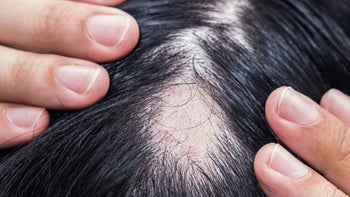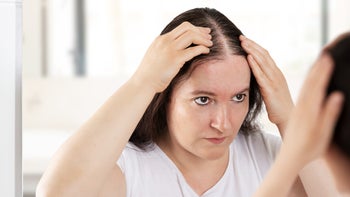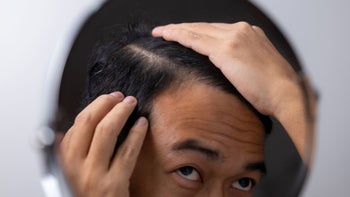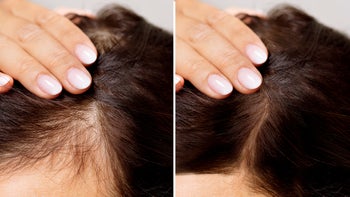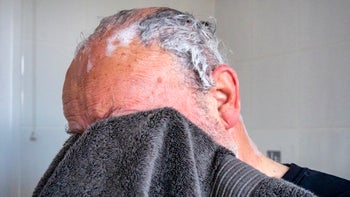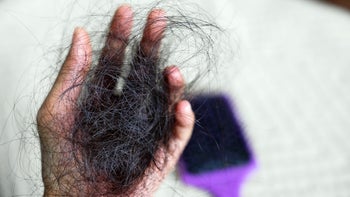
Will Taking Biotin Supplements Help Regrow My Hair?
Key takeaways:
Biotin (vitamin B7) is a nutrient you can get from food or supplements.
Biotin deficiency is linked to thinning hair, hair loss, and brittle nails.
It’s unclear whether biotin will help you regrow hair, but some people tell GoodRx it’s working for them.

Biotin, also known as vitamin B7, is a water-soluble vitamin that plays a key role in maintaining healthy hair, skin, and nails. It’s a B vitamin that’s found in foods like eggs, fatty fish, and spinach. Biotin also is widely available as an over-the-counter dietary supplement in various forms, such as capsules, softgels, and tablets. It’s also in many shampoos, creams, and oils.
While biotin deficiency has been linked to hair loss, the research on its effectiveness in promoting hair regrowth is limited.
Three people who have taken biotin supplements to stimulate hair growth tell GoodRx that it takes awhile to notice results — but they see a difference.
SHINGRIX (Zoster Vaccine Recombinant, Adjuvanted) is now $0 for almost everyone*
Get SHINGRIX at the pharmacy or in-network doctor’s office today. 98% of privately insured people pay $0 and all Medicare Part D beneficiaries pay $0 at the pharmacy.
Prescribing Information
*Coverage and cost may vary and are subject to change without notice. Reimbursement decisions are made by individual insurance plans.


SHINGRIX is an FDA-approved vaccine for the prevention of shingles (herpes zoster) in adults 50 years and older. SHINGRIX is not used to prevent chickenpox.
• You should not receive SHINGRIX if you are allergic to any of its ingredients or had an allergic reaction to a previous dose of SHINGRIX
• An increased risk of Guillain-Barré syndrome (severe muscle weakness) was observed after vaccination with SHINGRIX
• Fainting can happen after getting injectable vaccines, including SHINGRIX. Precautions should be taken to avoid falling and injury due to fainting
• The most common side effects are pain, redness, and swelling at the injection site, muscle pain, tiredness, headache, shivering, fever, and upset stomach
• SHINGRIX was not studied in pregnant or nursing women. Tell your healthcare provider if you are pregnant, plan to become pregnant, or are breastfeeding
• Vaccination with SHINGRIX may not protect all individuals
• Ask your healthcare provider about the risks and benefits of SHINGRIX. Only a healthcare provider can decide if SHINGRIX is right for you
You are encouraged to report vaccine adverse events to the US Department of Health and Human Services. Visit www.vaers.hhs.gov to file a report, or call 1-800-822-7967.
For US audiences.
Trademarks are property of their respective owners.
©️2024 GSK or licensor.
PMUS-SGXWCNT240015 May 2024
Produced in the USA.
GoodRx Health information and resources are reviewed by our editorial staff with medical and healthcare policy and pricing experience. See our editorial policy for more detail. We also provide access to services offered by GoodRx and our partners when we think these services might be useful to our visitors. We may receive compensation when a user decides to leverage these services, but making them available does not influence the medical content our editorial staff provides.
Retired computer programmer notices thicker eyelashes
Jeanette Murray took biotin years ago, before she retired from her career as a computer programmer. It helped her fingernails, which took a beating from relentless keyboard pounding. “My nails grew like crazy,” she says.
“I do remember in the past that it did seem to thicken my hair some,” Jeanette says. “But my hair was already quite thick, so it was hard for me to really attribute that to the biotin.”
Now 70 and living in Covington, Kentucky, Jeanette says she restarted her biotin routine late last year. The effects on hair growth are visible but not dramatic.

“I noticed it in my eyelashes, which is weird,” she says. “I do think it makes a difference.”
Today, Jeanette says, “the hair on top of my head does seem to be a bit thicker. And it was noticeably thinning. I just attributed that to being old.”
Overall, Jeanette says, “I do notice some thickening of my hair. But that takes much longer to be noticeable than the impact on the nails.”
As for side effects, she says, there are none. “For me, it’s a very innocuous kind of supplement,” Jeanette says.
Hairstylist sees a difference in her hair and nails
Terry Palmer, a hairstylist in Cincinnati, started taking biotin after a bout with COVID-19 in March 2021. For her, a side effect of COVID was losing a “significant amount” of hair.
Today, Terry takes 2,500 mcg of biotin a day.
Websites touting biotin for hair growth recommend taking 2 to 5 mg (2,000 to 5,000 mcg) of biotin in supplement form each day. It’s not likely to cause side effects even at high doses, but the recommended daily amount for adults is 30 mcg a day.
“It took probably 6 to 8 months for me to see some real change,” Terry says. “I think that’s kind of normal. Because if it’s regenerating the follicles, it’s going to take at least 3 and up to 8 months to see more fullness.”

Terry, who is 66, says that many of her older clients are worried about hair loss. “It’s an unfair trick of nature. With your dip in estrogen, your hair thins.”
Yet “it is all ages,” she says. “With what we’ve been going through [after the COVID-19 pandemic], there’s been so much stress, which can cause hair to thin.”
Terry shares her biotin experience when friends and family ask for recommendations. “Most of the people I have told have had success,” she says.
There are also bonus effects. “My husband started taking it,” Terry says. “Within a month or two, he noticed his nails were no longer peeling.” And “my nails are doing really well,” she says.
Her dermatologist recommended biotin for her hair
Corinne Kanikula, an 81-year-old retired nurse living in Wheaton, Illinois, did not worry too much about hair loss until later in life.
“My hair is very fine,” she says. “I always had so much of it that a couple times a year they would have to thin it out.”
When hairdressers stopped thinning her hair, she noticed. “I still had hair, but there wasn’t as much of it as it used to be.”
Another sign: “Tom, my husband, would complain when he had to clean the drain out in the shower. My concern was, ‘How bad is this gonna get?’ That’s why I talked to the dermatologist about it.”
Corinne sees a dermatologist for treatment of chronic psoriasis. The dermatologist advised her that biotin was a good choice for her concern about hair.
Now, Corinne takes a combination supplement that includes 2,500 mcg of biotin, plus several other vitamins and herbal extracts every day.

“I’m just at the 6 months that she said was required to really know if it was going to work,” Corinne says. The verdict? “It’s working.”
“Just last week it so happened Tom cleaned the drain out in the shower, and he said there was little or no hair there. And when I brush my hair out, it does feel like there’s more of it.”
The only thing Corinne dislikes about the routine is swallowing the capsules. “They’re large, and I have to take four of them every night after dinner,” she says. “I don’t like doing that. But I do it every single night.”
What does the pharmacist say?

Stacia Woodcock, PharmD
Pharmacy Editor
Biotin is a member of the B-vitamin family and is also referred to as vitamin B7 or vitamin H. It’s found in a variety of food sources, including eggs, sweet potatoes, and salmon. Most people are able to get the recommended daily amount (30 mcg daily for most adults) from their regular diet. So biotin deficiencies aren’t common.
Low biotin levels can cause thinning hair, a scaly, red skin rash, and brittle nails. Taking a biotin supplement can help correct these issues if your biotin levels are low. This has led to the widespread belief that biotin supplements can help with skin, hair, and nail issues. But this doesn’t seem to be the case unless your biotin levels are lower than they should be.
Several things can make low biotin levels more likely, including:
Pregnancy
Anti-seizure medications
Taking long-term antibiotics
Isotretinoin medications
Excessive alcohol consumption
Smoking, especially in women
Poor absorption of biotin from food
Inadequate biotin intake, or excessive intake of raw egg whites
If you’re concerned about thinning hair or brittle nails, it’s best to see a healthcare professional before taking biotin. They can test your biotin levels and look for other causes of your symptoms, such as thyroid issues, low iron or vitamin D levels, or autoimmune disease. Be sure to let them know if you have any of the above risk factors.
Keep in mind that while biotin supplements are generally considered safe, they can interfere with lab tests for thyroid conditions and vitamin D levels. They can also interfere with a blood test used to help diagnose heart attacks. So it’s best to avoid taking biotin unless your healthcare team approves it and other causes of your symptoms have been ruled out.
Why trust our experts?






